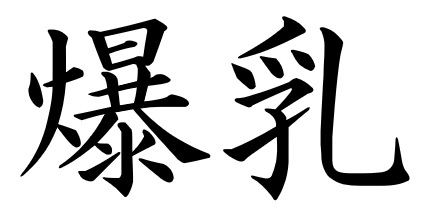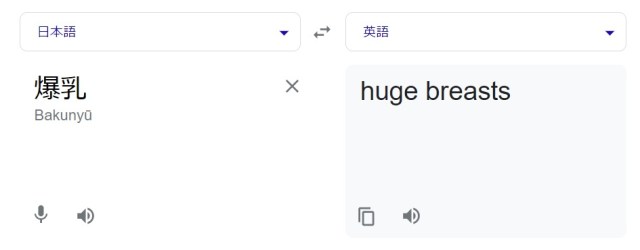
Apparently Tucker Carlson never read our explanation of Japanese breast-related vocabulary.
In a video segment posted to the Fox News website on September 21, host Tucker Carlson commented on a high school teacher in Ontario, Canada, who wears a set of prosthetic breasts while teaching. Video of the teacher has gone viral, and Carlson asserts that the prosthetics are inexcusable for an educator to be wearing while working with minors, stating:
“That teacher has recently started wearing enormous prosthetic breasts in the classroom in front of children as part of a sexual fetish. In case you doubt that it is, the costume is intended to emulate a genre of Japanese pornography that translates roughly as ‘exploding milk porn.’”
Setting aside the accuracy or lack thereof of Carlson’s assessment of the teacher’s motivation for wearing the prosthetics, as well as the debate as to their level of appropriateness for a classroom setting, there is one ironclad, definitive statement I can make here: “Exploding milk” is not a genre of Japanese pornography.
So what’s the reason for Carlson’s lascivious lactose linguistic confusion? The word bakunyuu.
▼ Bakunyuu written in kanji. Also the most safe-for-work bakunyuu image you’ll ever find on the Internet.
The first kanji in bakunyuu, 爆, means “to burst, rupture, or explode.” It’s the same kanji that shows up in bakuhatsu (爆発), the Japanese word for “explosion.”
The second kanji in bakunyuu, 乳, has two potential meanings, and one of them is indeed “milk,” like in the word gyuunyuu (牛乳), “cow’s milk.” In Japanese, though, there’s a lot of linguistic overlap between the concepts of milk itself and its source, and 乳 can also be used to mean “breasts.”
It’s this second meaning, “breasts,” that bakunyuu is referring to, and so the literal translation isn’t “exploding milk,” but “exploding breasts.” That’s “exploding” metaphorically, by the way, in the sense of breasts that are dynamically, dramatically large, and so the more natural translation would be “gigantic breasts,” though if you wanted to be colorful I suppose you could go with something like “bazongas.”
Aside from Carlson’s mistranslation, calling bakunyuu a genre of pornography, ironically, diminishes the word. It’s like saying “big boobs” is a porn genre, while ignoring that the term has a meaning and uses outside of discussing porn.
As to how Carlson, or his research assistants, came under the impression that “exploding milk” was an acceptably accurate translation, it’s hard to say. Even plugging bakunyuu into Google translate spits back “huge breasts,” not “exploding milk.”
▼ Wow, two safe-for-work bakunyuu images in one article!
That said, “exploding milk” does sound like just the sort of thing an automated machine translation would spit back, especially a program that gets confused when it runs into a term that it can’t find in whatever static straight-laced Japanese-English dictionary it’s using as its knowledge base and just decides to translate each kanji separately.
That still leaves the question, though, of how Fox News came across the word bakunyuu in the first place, and why they chose to connect it to the story about the teacher. It’s not like Japan is the only country with a term than means “huge breasts,” and bakunyuu doesn’t include any implication that the explosively large breasts are prosthetics. It’s enough to make one wonder if someone who’d had personal experience browsing through Japanese adult video sites with the aid of some sub-par automated translation software stumbled across the “exploding milk” mistranslation, starting of a chain of misconceptions that eventually made it to Carlson and onto the air during the video.
Still, it’s a really weird mistake to make, especially since I explained bakunyuu, plus a whole lot of other Japanese words for talking about breasts, right here on SoraNews24 a long time ago.
Video source: Fox News via Anime News Network/Kim Morrissy
Top image: Pakutaso (edited by SoraNews24)
Insert images: SoraNews24, Google
● Want to hear about SoraNews24’s latest articles as soon as they’re published? Follow us on Facebook and Twitter!
Follow Casey on Twitter for more words they didn’t teach you in Japanese class.



 Japanese women’s breasts get dismal satisfaction evaluation…from their owners
Japanese women’s breasts get dismal satisfaction evaluation…from their owners Burger King launches perplexing ‘PooPoo Smoothie’ in China
Burger King launches perplexing ‘PooPoo Smoothie’ in China Chinese restaurant has the most epic English menu of all time
Chinese restaurant has the most epic English menu of all time Japanese Twitter users make Osaka Metro’s English translation mistakes into running joke, memes
Japanese Twitter users make Osaka Metro’s English translation mistakes into running joke, memes Trying out Starbucks Japan’s ultra relaxing 2021 seasonal summer tea drinks【Taste Test】
Trying out Starbucks Japan’s ultra relaxing 2021 seasonal summer tea drinks【Taste Test】 Red light district sushi restaurant in Tokyo shows us just how wrong we were about it
Red light district sushi restaurant in Tokyo shows us just how wrong we were about it Tokyo Tsukiji fish market site to be redeveloped with 50,000-seat stadium, hotel, shopping center
Tokyo Tsukiji fish market site to be redeveloped with 50,000-seat stadium, hotel, shopping center Japanese ramen restaurants under pressure from new yen banknotes
Japanese ramen restaurants under pressure from new yen banknotes McDonald’s new Happy Meals offer up cute and practical Sanrio lifestyle goods
McDonald’s new Happy Meals offer up cute and practical Sanrio lifestyle goods Beautiful Red and Blue Star luxury trains set to be Japan’s new Hokkaido travel stars
Beautiful Red and Blue Star luxury trains set to be Japan’s new Hokkaido travel stars Pokémon Sleep camping suite and guestrooms coming to Tokyo Hyatt along with giant Snorlax burgers
Pokémon Sleep camping suite and guestrooms coming to Tokyo Hyatt along with giant Snorlax burgers Osaka’s creepy cute mascot speaks for first time, adds more fuel the creepy OR cute debate【Video】
Osaka’s creepy cute mascot speaks for first time, adds more fuel the creepy OR cute debate【Video】 French Fries Bread in Tokyo’s Shibuya becomes a hit on social media
French Fries Bread in Tokyo’s Shibuya becomes a hit on social media Mt. Koya planning to instate visitor’s tax to cope with huge tourist numbers
Mt. Koya planning to instate visitor’s tax to cope with huge tourist numbers Starbucks Japan adds a Motto Frappuccino to the menu for a limited time
Starbucks Japan adds a Motto Frappuccino to the menu for a limited time All-you-can-drink Starbucks and amazing views part of Tokyo’s new 170 meter-high sky lounge
All-you-can-drink Starbucks and amazing views part of Tokyo’s new 170 meter-high sky lounge More foreign tourists than ever before in history visited Japan last month
More foreign tourists than ever before in history visited Japan last month Studio Ghibli releases new action figures featuring Nausicaä of the Valley of the Wind characters
Studio Ghibli releases new action figures featuring Nausicaä of the Valley of the Wind characters New private rooms on Tokaido Shinkansen change the way we travel from Tokyo to Kyoto
New private rooms on Tokaido Shinkansen change the way we travel from Tokyo to Kyoto Starbucks reopens at Shibuya Scramble Crossing with new look and design concept
Starbucks reopens at Shibuya Scramble Crossing with new look and design concept Studio Ghibli glasses cases let anime characters keep an eye on your spectacles
Studio Ghibli glasses cases let anime characters keep an eye on your spectacles Beautiful Ghibli sealing wax kits let you create accessories and elegant letter decorations【Pics】
Beautiful Ghibli sealing wax kits let you create accessories and elegant letter decorations【Pics】 Studio Ghibli releases Kiki’s Delivery Service chocolate cake pouches in Japan
Studio Ghibli releases Kiki’s Delivery Service chocolate cake pouches in Japan New definition of “Japanese whiskey” goes into effect to prevent fakes from fooling overseas buyers
New definition of “Japanese whiskey” goes into effect to prevent fakes from fooling overseas buyers Our Japanese reporter visits Costco in the U.S., finds super American and very Japanese things
Our Japanese reporter visits Costco in the U.S., finds super American and very Japanese things Studio Ghibli unveils Mother’s Day gift set that captures the love in My Neighbour Totoro
Studio Ghibli unveils Mother’s Day gift set that captures the love in My Neighbour Totoro New Japanese KitKat flavour stars Sanrio characters, including Hello Kitty
New Japanese KitKat flavour stars Sanrio characters, including Hello Kitty New Pokémon cakes let you eat your way through Pikachu and all the Eevee evolutions
New Pokémon cakes let you eat your way through Pikachu and all the Eevee evolutions Disney princesses get official manga makeovers for Manga Princess Cafe opening in Tokyo
Disney princesses get official manga makeovers for Manga Princess Cafe opening in Tokyo Sales of Japan’s most convenient train ticket/shopping payment cards suspended indefinitely
Sales of Japan’s most convenient train ticket/shopping payment cards suspended indefinitely Sold-out Studio Ghibli desktop humidifiers are back so Totoro can help you through the dry season
Sold-out Studio Ghibli desktop humidifiers are back so Totoro can help you through the dry season Japanese government to make first change to romanization spelling rules since the 1950s
Japanese government to make first change to romanization spelling rules since the 1950s Ghibli founders Toshio Suzuki and Hayao Miyazaki contribute to Japanese whisky Totoro label design
Ghibli founders Toshio Suzuki and Hayao Miyazaki contribute to Japanese whisky Totoro label design Doraemon found buried at sea as scene from 1993 anime becomes real life【Photos】
Doraemon found buried at sea as scene from 1993 anime becomes real life【Photos】 Tokyo’s most famous Starbucks is closed
Tokyo’s most famous Starbucks is closed One Piece characters’ nationalities revealed, but fans have mixed opinions
One Piece characters’ nationalities revealed, but fans have mixed opinions We asked a Uniqlo employee what four things we should buy and their suggestions didn’t disappoint
We asked a Uniqlo employee what four things we should buy and their suggestions didn’t disappoint Princesses, fruits, and blacksmiths: Study reveals the 30 most unusual family names in Japan
Princesses, fruits, and blacksmiths: Study reveals the 30 most unusual family names in Japan New “health care” app will measure woman’s cup size if she puts a smartphone between her breasts
New “health care” app will measure woman’s cup size if she puts a smartphone between her breasts Kanji T-shirt seen on U.S. TV show makes Japanese viewers giggle
Kanji T-shirt seen on U.S. TV show makes Japanese viewers giggle Choshimaru offers a limited-time Explodingly Big Sushi Roll, or basically sushi in sushi armor
Choshimaru offers a limited-time Explodingly Big Sushi Roll, or basically sushi in sushi armor Add a dash of Kyoto culture to your daily snack with Uji Matcha chocolate-covered potato chips
Add a dash of Kyoto culture to your daily snack with Uji Matcha chocolate-covered potato chips “Good on the floor?” Five funny times Google Translate drops the ball with Japanese idioms
“Good on the floor?” Five funny times Google Translate drops the ball with Japanese idioms 7-Eleven’s new whipped cream sandwich takes Japanese convenience store food to a whole new level
7-Eleven’s new whipped cream sandwich takes Japanese convenience store food to a whole new level Kyoto accidentally calls all old people “terrible drivers”【Why Does Engrish Happen in Japan?】
Kyoto accidentally calls all old people “terrible drivers”【Why Does Engrish Happen in Japan?】 Japan announces Kanji of the Year for 2019, and it was really the only logical choice
Japan announces Kanji of the Year for 2019, and it was really the only logical choice Kanji fail — Japanese parents shocked to learn their baby girl’s name has inappropriate meaning
Kanji fail — Japanese parents shocked to learn their baby girl’s name has inappropriate meaning The Phantom Limb Project: Gamer to get prosthetic limb inspired by Metal Gear Solid V
The Phantom Limb Project: Gamer to get prosthetic limb inspired by Metal Gear Solid V U.S. college student learns the hard way to get your Japanese kanji tattoo checked by an expert
U.S. college student learns the hard way to get your Japanese kanji tattoo checked by an expert Niigata school superintendent resigns over improper use of Japanese word for “you”
Niigata school superintendent resigns over improper use of Japanese word for “you” Japanese teacher criticized for attending son’s entrance ceremony instead of her own school’s
Japanese teacher criticized for attending son’s entrance ceremony instead of her own school’s Presenting the Kit Kat Chocolatory Moleson — the first ever Kit Kat with toppings!
Presenting the Kit Kat Chocolatory Moleson — the first ever Kit Kat with toppings!
Leave a Reply